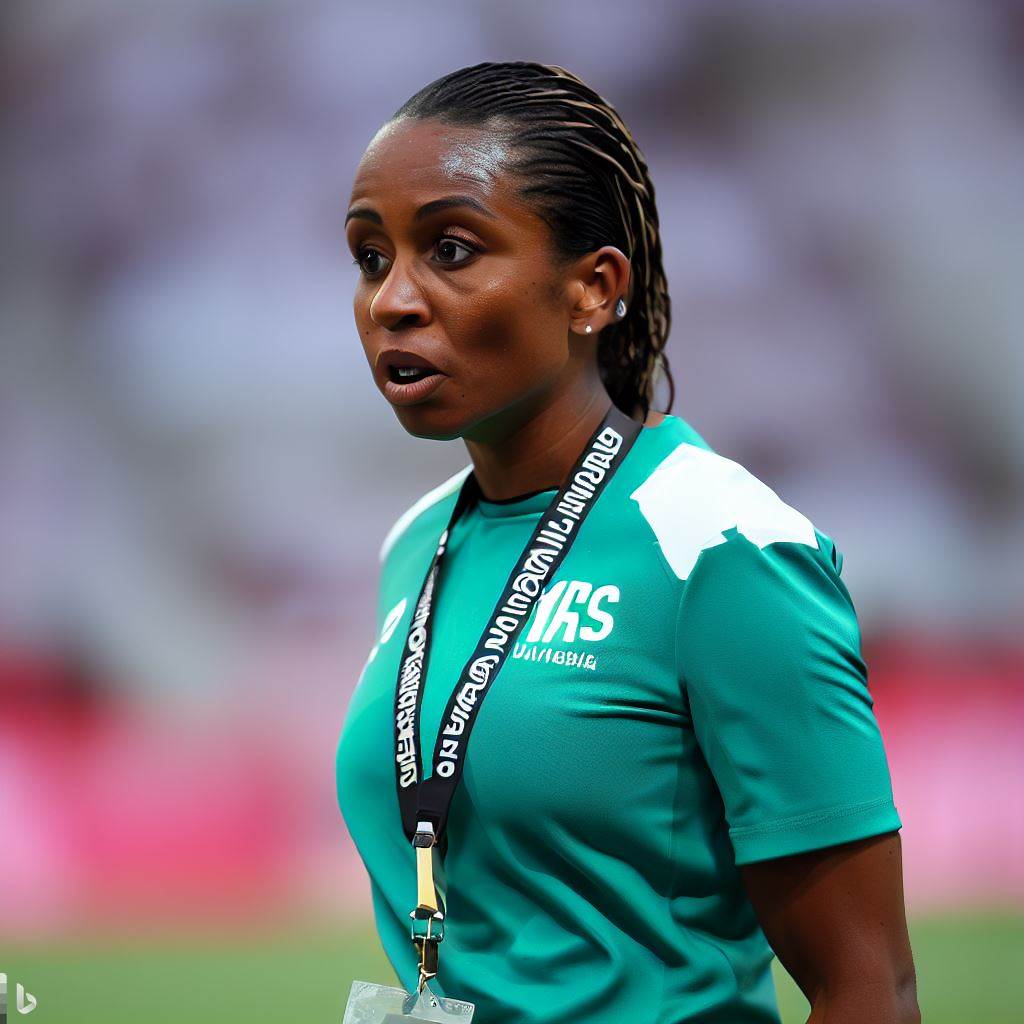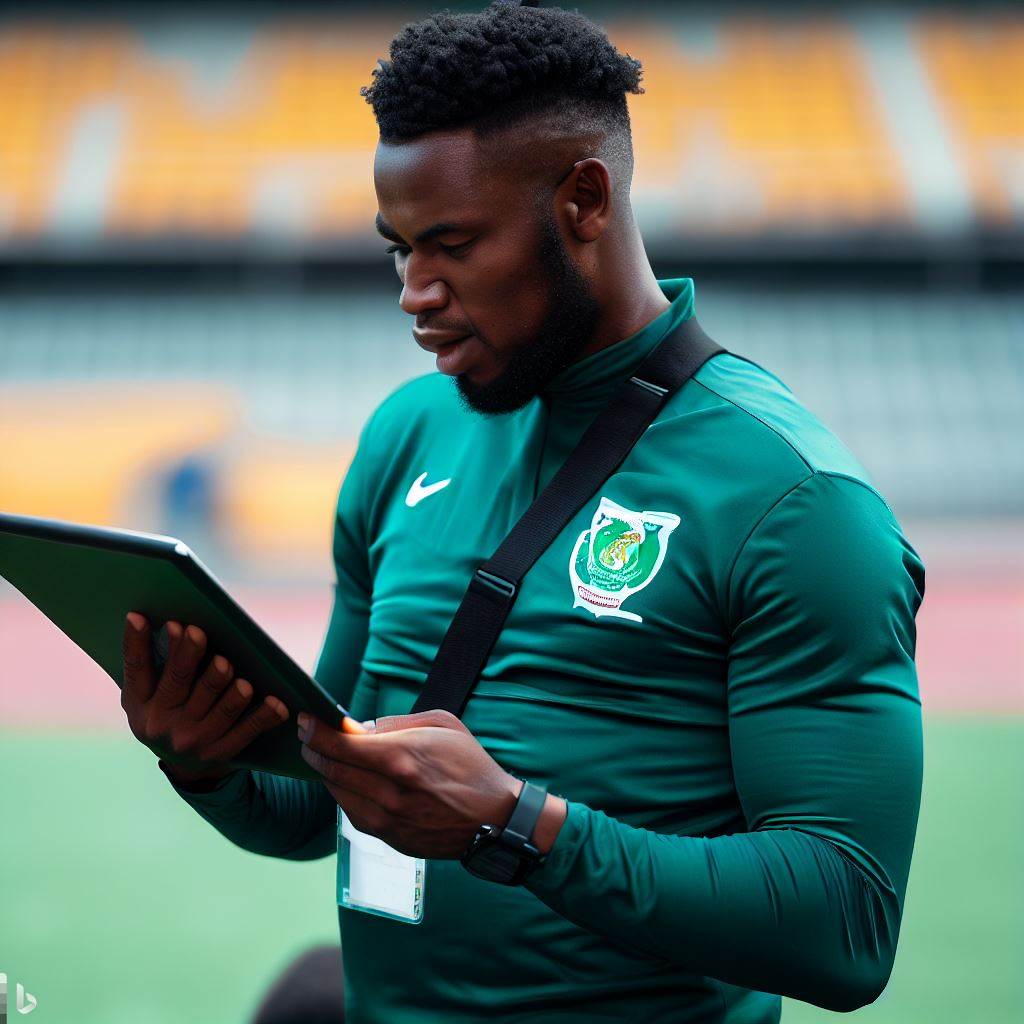Introduction
In Nigeria, assistant coaching roles hold immense significance. They contribute to sports development and gender equality.
Women are gradually breaking barriers and making their mark in the traditionally male-dominated field of coaching in Nigeria.
Thesis Statement
Women’s presence and impact in Nigerian assistant coaching roles are on the rise, despite obstacles.
Why does this matter?
- Empowerment: Women coaches inspire young girls, fostering empowerment and self-belief.
- Role Models: Female coaches serve as role models, breaking stereotypes in sports.
- Skill Development: Women bring diverse skills and perspectives to coaching, enhancing team dynamics.
- National Progress: Their contributions drive Nigeria’s sports advancement on the global stage.
- Challenges Remain: Despite progress, gender bias and limited opportunities persist.
- Promising Future: With continued support and recognition, women in assistant coaching will further elevate Nigerian sports.
This article delves into the remarkable journey of women in assistant coaching roles, highlighting their dedication and the transformative impact they make.
Historical Context
A. Overview of the traditional roles and stereotypes of women in Nigerian society
- In Nigerian society, women have traditionally been confined to domestic roles and seen as caregivers.
- They have been expected to prioritize family and home over pursuing professional careers.
- Gender roles have perpetuated the idea that women should not be involved in activities traditionally associated with men.
- This mindset has limited the opportunities available to women and created societal stereotypes regarding their capabilities.
B. Limited opportunities for women in coaching positions in the past
- Historically, coaching has been viewed as a masculine profession in Nigeria.
- Women have faced numerous challenges and biases when attempting to pursue coaching roles.
- Limited opportunities for women in coaching were mainly due to gender discrimination and societal norms.
- Women were often overlooked for coaching positions, regardless of their qualifications and capabilities.
- The belief that coaching required physical strength and leadership skills considered masculine hindered women’s progress in this field.
- Often, women were only given assistant coaching roles, serving as supporting staff rather than taking on leadership positions.
- These limited opportunities not only restricted women’s professional growth but also reinforced gender stereotypes.
- Women faced barriers like lack of support, gender-based discrimination, and cultural expectations that discouraged them from pursuing coaching careers.
- In this context, women were often forced to remain on the sidelines, unable to actively participate in the development of Nigerian sports.
- These historical injustices have had lasting effects on the representation of women in coaching positions in Nigeria.
1. Traditional roles and stereotypes of women in Nigerian society
- Confined to domestic roles
- Seen as caregivers
- Expected to prioritize family and home
- Gender roles perpetuated limitations
2. Challenges faced by women in pursuing coaching positions
- Gender discrimination
- Societal norms and biases
- Limited opportunities despite qualifications
- Physical strength and leadership seen as masculine traits
- Only offered assistant coaching roles
3. Barriers for women in coaching
- Lack of support
- Gender-based discrimination
- Cultural expectations
- Discouragement from pursuing coaching careers
- Marginalized participation in sports development
By acknowledging the historical context and the limited opportunities for women in coaching positions in Nigeria, we can better understand the challenges they face.
Breaking down these barriers is essential for promoting gender equality and empowering women to strive for leadership roles in sports coaching.
Read: Ethics in Sports Journalism: A Guide for Nigerian Professionals
Changing Landscape
A. Factors that have contributed to the increased presence of women in assistant coaching roles
The presence of women in assistant coaching roles in Nigeria has seen a significant increase in recent years.
This positive change can be attributed to several key factors that have contributed to breaking down gender barriers and promoting equality in the coaching field.
Firstly, the increased awareness and advocacy for women’s rights and gender equality have played a crucial role in creating opportunities for women in assistant coaching roles.
Society as a whole has become more conscious of the importance of equal representation and the need to empower women in all professional fields, including sports coaching.
This awareness has led to a greater demand for female coaches and has opened up doors for women in traditionally male-dominated roles.
In addition, sports organizations have made conscious efforts to promote diversity and inclusion within their coaching staff.
Recognizing the benefits of having a diverse coaching team, these organizations have implemented policies and programs aimed at increasing the representation of women in coaching roles.
This includes creating pathways for women to enter coaching positions, providing mentorship programs, and offering training and development opportunities specifically for female coaches.
Furthermore, the emergence of successful female coaching role models has had a significant impact on attracting more women to assistant coaching roles.
Women who have excelled in coaching positions serve as inspiration for aspiring female coaches, showing them that it is possible to break through societal barriers and succeed in the field.
These role models help to challenge stereotypes and encourage more women to pursue coaching careers.
B. Analysis of the progress made in breaking gender barriers in coaching positions
The progress made in breaking gender barriers in coaching positions in Nigeria is evident in the increasing presence of women in assistant coaching roles.
The factors mentioned above have collectively contributed to this positive change.
However, it is important to note that more work is still needed to achieve full gender equality in coaching.
While there has been an increase in the number of women in assistant coaching roles, they still face challenges and biases that stem from traditional gender roles and societal expectations.
Women coaches often have to work harder to prove themselves and overcome stereotypes and biases that suggest women are less capable in coaching positions.
Additionally, there is a need for more targeted efforts to attract and retain women in coaching.
This includes providing equal opportunities for career advancement, ensuring fair and equal pay, and creating a supportive and inclusive environment for women coaches to thrive.
Lastly, the increased presence of women in assistant coaching roles in Nigeria is a result of various factors, including increased awareness and advocacy for women’s rights, efforts by sports organizations to promote diversity, and the emergence of successful female coaching role models.
While progress has been made, there is still work to be done to break down remaining gender barriers and achieve true gender equality in coaching positions.
Read: How to Start a Career in Sports Journalism in Nigeria

Challenges Faced by Women in Assistant Coaching Roles
A. Discrimination and stereotypes
- Women in assistant coaching roles often face discrimination based on their gender.
- They are often subjected to stereotypes that suggest they are less competent than their male counterparts.
- This discrimination and stereotypes can make it difficult for women to gain respect and recognition in their coaching positions.
B. Lack of support and resources compared to male counterparts
- Women in assistant coaching roles often do not receive the same level of support and resources as their male counterparts.
- This lack of support can hinder their ability to effectively coach and develop their skills.
- It can also limit their access to important opportunities for professional growth and advancement within the coaching industry.
C. Balancing coaching responsibilities with traditional gender roles and societal expectations
- Women in assistant coaching roles often face challenges in balancing their coaching responsibilities with traditional gender roles and societal expectations.
- They may be expected to prioritize caregiving and domestic responsibilities over their coaching careers.
- This can result in limited time and energy for coaching, making it difficult for women to fully commit to their roles and excel in their positions.
D. Limited opportunities for professional development and career advancement
- Women in assistant coaching roles often have limited opportunities for professional development and career advancement.
- They may not have access to necessary resources, such as mentorship programs or training opportunities.
- This can hinder their ability to acquire new skills, expand their knowledge, and advance in their coaching careers.
- The lack of opportunities for career advancement can also contribute to a lack of diversity and representation in coaching positions.
In essence, women in assistant coaching roles in Nigeria face numerous challenges that hinder their success and advancement in the coaching industry.
Discrimination and stereotypes, lack of support and resources, difficulty balancing coaching responsibilities with traditional gender roles, and limited opportunities for professional development all contribute to these challenges.
It is crucial for the sporting community and society as a whole to recognize and address these challenges in order to provide equal opportunities and support for women in assistant coaching roles.
By doing so, we can promote gender equality and help women thrive and excel in the coaching profession.
Read: Salaries in Sports Broadcasting: A Nigerian Perspective
See Related Content: Starting Your Journey in Nigeria’s Athletics Profession
Success stories and notable figures
A. Successful Female Assistant Coaches in Nigeria
- Omorede Izevbigie: Former assistant coach for Nigeria’s women’s national football team.
- Ann Agumanu-Chiejine: Assistant coach for Nigeria’s women’s U-17 national team, helping them win the 2014 World Cup.
- Florence Omagbemi: Assisted the Super Falcons in winning the 2016 African Women’s Cup of Nations.
- Maureen Madu: Assistant coach for Nigeria’s women’s national basketball team.
- Blessing Okagbare: Former assistant coach for Nigeria’s track and field team, she won numerous medals.
B. Their Achievements and Contributions to Sports Development in Nigeria
Omorede Izevbigie played a crucial role in Nigeria’s women’s national football team’s success with expertise and dedication, securing international victories.
Ann Agumanu-Chiejine’s contribution to Nigerian sports is immense, as her assistant coaching led to a 2014 U-17 World Cup victory, bringing national pride.
Florence Omagbemi significantly boosted women’s football in Nigeria through her achievements as an assistant coach for the Super Falcons in the African Women’s Cup of Nations.
Maureen Madu’s instrumental role as an assistant coach for Nigeria’s women’s national basketball team facilitated regional and international success due to her expertise and coaching skills.
Blessing Okagbare, beyond her athletic achievements, has mentored young athletes and guided them to international success as an assistant coach for Nigeria’s track and field team.
These figures achieved personal success and paved the way for female coaches in Nigeria, demonstrating that gender is not a limit in coaching careers, shattering stereotypes in a male-dominated field.
Their accomplishments should be celebrated, providing inspiration and role models for aspiring female coaches, promoting gender equality in sports.
Recognizing their achievements encourages women to break barriers and make a positive coaching impact.
The success and contributions of these female assistant coaches emphasize the need for equal opportunities and support for women in sports, inspiring more to excel and impact coaching.
Read: Top 10 Sports Broadcasters in Nigeria: A 2023 Overview
Strategies for Further Progress
A. Encouraging policy changes and equal opportunities in coaching positions
- Advocate for the implementation of policies that promote gender equality in coaching roles.
- Push for equal opportunities for women to become assistant coaches in various sports.
- Encourage sports organizations to adopt inclusive hiring practices and eliminate gender bias.
- Work closely with government bodies to create and enforce laws that protect women’s rights in coaching positions.
B. Mentorship programs and professional development opportunities for women
- Establish mentorship programs where experienced women coaches can guide and support aspiring coaches.
- Create networking platforms that connect women coaches and provide opportunities for knowledge sharing.
- Offer scholarships and funding for women to attend coaching clinics, workshops, and certification programs.
- Collaborate with sports academies and universities to develop tailored coaching courses for women.
C. Promoting inclusive sports environments and challenging gender stereotypes
- Educate athletes, coaches, and sports administrators about the benefits of gender diversity in coaching.
- Organize workshops and awareness campaigns to challenge and break down gender stereotypes in sports coaching.
- Create safe spaces for women coaches to share their experiences, concerns, and ideas.
- Encourage male athletes and coaches to become allies in promoting gender equality in coaching roles.
By implementing these strategies, we can create a more inclusive and equal coaching landscape for women in Nigeria.
It is essential to address the barriers and biases that have hindered their progress and provide them with the support and opportunities they deserve.
Together, we can empower women assistant coaches and pave the way for their success in Nigerian sports.
Delve into the Subject: Nigeria’s National Sports Policies: An In-Depth Review
Conclusion
A. Growing Presence of Women in Assistant Coaching Roles in Nigeria
Women are making waves in assistant coaching roles in Nigeria.
They’re breaking barriers, inspiring change, and enhancing diversity in sports.
- Women like Florence Omagbemi and Ann Chiejine have shown exceptional coaching skills in Nigerian football.
- Their success highlights that women can excel in coaching roles traditionally dominated by men.
- Female assistant coaches bring unique perspectives and insights to the game, enriching the coaching landscape.
- The increased representation of women in coaching also benefits player development and team dynamics.
B. Importance of Continued Support and Empowerment
Efforts to support and empower women in coaching roles must persist for several reasons.
- Continued support ensures that the momentum of women’s involvement in coaching doesn’t wane.
- Empowering women in sports sends a powerful message about gender equality in Nigeria.
- It fosters an environment where aspiring female coaches can pursue their dreams without barriers.
Finally, women in assistant coaching roles in Nigeria are making remarkable strides. Sustaining these efforts is crucial to promote equality and diversity in sports coaching.




